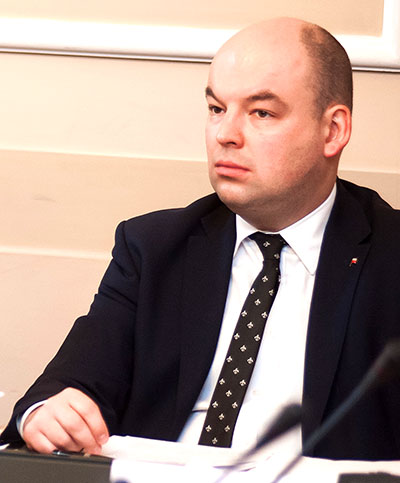
Commemorating Polish heroes is almost as effective in promoting the truth about Polish history as the first-hand accounts of its witnesses. We should bring these figures back to life as often as possible.
In conversation with Deputy Minister of Foreign Affairs Jan Dziedziczak
Several months ago you presented the badge of honour Bene Merito to Karol Tendera, an Auschwitz survivor and one of the key figures in the project “What Was the Truth? German Camps, Polish Heroes”. Karol Tendera is fighting against historical distortions and untruthful phrases such as “Polish concentration camps”. Do you think the appeals of Auschwitz survivors for more honesty and accuracy in historical accounts can make a lasting impression on the general public in the West?
Karol Tendera is one of the few surviving witnesses to history who can pass on the true story of the atrocities perpetrated in German concentration camps. One cannot overestimate this initiative taken by former concentration camp prisoners and witnesses to history. They continue to tell the true story of German-occupied Poland and contribute to building the public image of Poland globally. It is our duty to promote the accounts of first-hand witnesses to these dramatic events. The real value of their stories is that they are truly genuine. They are also heavily charged emotionally and speak louder than diluted historical studies. Our position is secure, because we do not have to spice up history. All we have to do is demand the truth. That is why the Ministry of Foreign Affairs suggests that the phrase “defective codes of memory” should be used by the press and on the Internet. The aim of the initiative is to put a stop to the falsification of history. Our campaign is to educate the general public and to promote the term “German concentration camps”.
The phrase “Polish concentration camps” has been used repeatedly by foreign journalists and politicians alike. Do you think that the global public are unaware of or tend to forget who perpetrated the atrocities and who were their victims?
I do hope that most of these people do it from ignorance instead of ill will. Our intention is not only to respond, but also to raise awareness, so that these and similar cases happen as rarely as possible and gradually disappear. The most frequent rationale for using this type of language is that many German concentration camps were located in German-occupied Poland. We find this argument unacceptable. German concentration camps were located all over Europe, but somehow the falsification of history affects only Poland. Polish authorities, historical institutions and citizens are faced with the daunting challenge of finding an effective way to convey accurate and reliable information on Poland’s recent history to the global general public.
What can we do to explain to foreign journalists that calling German concentration camps Polish is the falsification of history? Can the projects focused on education and promoting the truth about World War II, including the Łukasiewicz Institute, promote historical awareness?
It is necessary that we encourage journalists both in Poland and abroad to use accurate terminology concerning German death and concentration camps. Since there is no shared or objective outlook on history, the general public, including journalists all over the world, are prone to ignorance or incorrect interpretations. Take many key events in Poland’s recent history, which include, for example, the Molotov–Ribbentrop Pact, the German and Soviet invasion of Poland in 1939, the occupation of Poland, Polish-Jewish relations during World War II, and the impact of the Holocaust and concentration camp network on the lives of the prisoners and society as a whole. Our role is to reach out globally to the widest audience possible to promote the true history of this aspect of World War II. The Ministry of Foreign Affairs cooperates with a large number of Polish public bodies to continue educational campaigns on the subject. We are collaborating with the Institute of National Remembrance, the Polish Anti-Defamation League and many other institutions. One fine example in this respect are study visits in Poland by foreign opinion formers or intellectuals, including journalists and researchers in the history of Poland, the region and World War II. The onus is on us to pass on historical knowledge to future generations and foster the memory of World War II and related atrocities.
Do you think it is our duty to promote Polish heroism during World War II? Is it possible to promote the true accounts of Polish history by marking the lives of the Ulma family, Saint Maksymilian Kolbe or Witold Pilecki?
Commemorating Polish heroes is almost as effective in promoting the truth about Polish history as the first-hand accounts of its witnesses. We should bring these figures back to life as often as possible. Both the recent and remote history of Poland abounds with such people. The stories of ordinary people and their heroic conduct are a very potent tool in building a positive image of the Polish nation. Our ultimate goal is to foster the memory of the Ulma family, Saint Maksymilian Kolbe and many other Polish heroic martyrs to establish Poland as a country where honour and values are more important than life; where people are ready to risk their lives if there is only a glimmer of hope to save other human beings. Our history is packed with heroic figures that epitomise universal values that serve as role models for young people and that may be used as a foundation for building the truth about Polish history.
Do you think there is a need for Polish leaders of opinion to address both foreign and Polish audiences to drive the point home that our authorities will remain adamant on using phrases such as “Polish concentration camps”? What benefits will this bring?
It goes without saying that falsifications of history should not be perpetuated by Polish people. Fostering “defective codes of memory” may be detrimental to Poland if they are repeatedly used in interviews or publications that are aimed at fighting inaccurate terminology. The key benefit is that we promote historical truth and the credibility of Poland in the eyes of the global public. So long as we fall prey to inaccurate language we may find it very difficult to fight it abroad as well.
Do you think the general public in Poland agree on the need to fight the falsification of history? Some circles believe that we are overreacting, which is due to our hypersensitivity and inferiority complex.
The positive image of Poland and the struggle for historical truth should be a common goal for all. Being adamant on lies and distortions has little to do with inferiority complex. It is our shared responsibility to struggle for the truth, namely, that German concentration camps were located in German-occupied Poland. We should bear in mind that history has an impact on the current perceptions of Poland. In so doing, we are building both the here and now of Poland and its future.
What is the role of the Polish diaspora in fighting the falsifications and distortions of Polish history?
The role that the Polish diaspora have to play is perhaps larger than our role here at home. The problem was first reported by Polish organisations in North America. They began to educate Polish people about the threat behind the falsification of history and untruthful phrases such as “Polish concentration camps”. Back in the 1980s, the Polish diaspora in Canada heavily protested in front of the Toronto Star office to stop the newspaper from using this inaccurate terminology. Because Polish people abroad have direct access to foreign media and foreign public opinion, they can immediately respond to the falsifications of history, for example, by reporting relevant cases to the Polish authorities abroad. Obviously, since the Polish diaspora are also responsible for building the public image of Poland overseas, it is extremely important that Polish people abroad promote Polish heroism, address the Polish-Jewish relations and take a corrective stance against “Polish concentration camps”.



